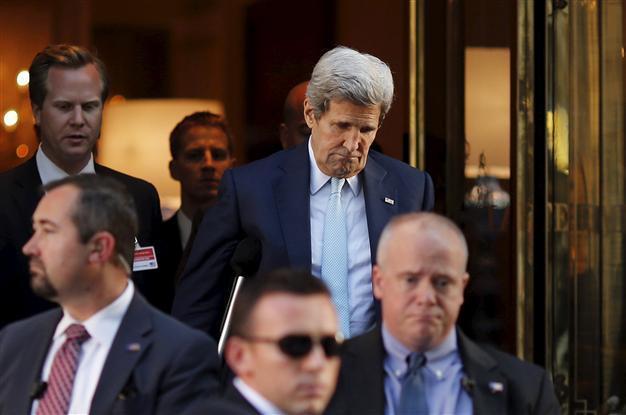Iran nuclear talks 'could go either way' in final straight
VIENNA - Agence France-Presse

REUTERS photo
Top ministers were due to meet July 6 seeking to conclude an unprecedented nuclear deal with Iran, on the eve of a deadline aiming to draw the curtain on almost two years of high-stakes negotiations.After criss-crossing the world since September 2013 chasing a complex accord to cut off Iran's pathways to developing nuclear arms, exhausted world powers warned Tehran now was the time to strike an accord or walk away.
US Secretary of State John Kerry, who met four times on July 5 with his Iranian counterpart Mohammad Javad, acknowledged that at the eleventh hour the talks still "could go either way".
"All the cards are on the table," added French Foreign minister Laurent Fabius, as he arrived back in Vienna for the final stretch with Tuesday's deadline looming.
There is no appetite to extend the talks once again after a series of missed deadlines, especially since the broad outlines of the deal were already hammered out in April.
If all sides were prepared to make hard choices, then "we could get an agreement this week. But if they are not made, we will not," Kerry warned, adding that if there was "absolute intransigence" the US would walk away.
"The main question is to know whether the Iranians will accept making clear commitments on what until now has not been clarified," Fabius added.
The global powers -- Britain, China, France, Germany, Russia and the United States -- are trying to pin down a deal putting a nuclear bomb out of Iran's reach in return for lifting a web of sanctions against the Islamic republic.
Some of the hardest issues still left have bedevilled the talks since the start -- probing allegations that in the past Iran sought nuclear weapons, finding a mechanism to lift the sanctions, and ensuring Iran can continue to have nuclear energy without the capacity to build a bomb.
"The time is now... We are very close," said the EU's foreign policy chief Federica Mogherini, adding the atmosphere was "constructive, positive".
"I see the political will ... now it is a matter of seeing all together if this political will manages to translate into political decisions."
Germany's Foreign Minister Frank-Walter Steinmeier flew back into the Austrian capital late July 5, along with Russia's top diplomat Sergei Lavrov. There was no confirmation when their Chinese and British counterparts were due, although they were expected on July 6.
Signs were emerging that some of the issues had been resolved by teams of experts who were now waiting for the ministers to sign off on their months of behind-the-scenes work.
In another indication of a breakthrough senior officials from the UN watchdog, the International Atomic Energy Agency (IAEA), were flying to Tehran for talks.
After talks in Iran last week, IAEA chief Yukiya Amano said the agency could complete by the end of the year a stalled probe into allegations that before 2003, and possibly since, Iran had sought to develop nuclear arms.
A deal also holds out the prospect of bringing Iran back into the diplomatic fold, amid a myriad of global challenges and conflict.
Zarif said in an English YouTube message that an accord could "open new horizons to address important common challenges", denouncing the "growing menace of violent extremism and outright barbarism" in an reference to the Islamic State of Iraq and the Levant (ISIL) militant group.
"I think it would be very difficult to imagine Secretary Kerry at this point walking away, this close to the finish line," Iran expert Suzanne Maloney from the Brookings Institution told AFP.
"I just don't think there's any real likelihood that this collapses."
















